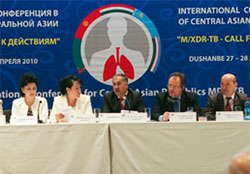International conference of central Asian republics on M/XDR-TB

Asia Plus Editorial Board/Nozim Kalandarov
Press release, Dushanbe, Tajikistan
An international conference on multidrug- and extensively drug-resistant tuberculosis (M/XDR-TB) will be held on 27 and 28 April 2010, focusing on the central Asian republics. The conference is organized jointly by the Ministry of Health of Tajikistan and the Regional Office, with the financial support of the German Bank for Development (KFW Entwicklungsbank).
Participants include representatives of ministries of health from Kazakhstan, Kyrgyzstan, Tajikistan, Turkmenistan and Uzbekistan, tuberculosis and laboratory diagnostic experts from China, Germany, Japan, the Russian Federation and the United States, and representatives of international agencies and donors working to combat tuberculosis, such as WHO, KFW Entwicklungsbank, the Centers for Disease Control and Prevention, KNCV Tuberculosis Foundation, Project Hope, The Global Fund to Fight AIDS, Tuberculosis and Malaria, Caritas Luxembourg, Partners in Health, the International Organization for Migration and Abt Associates. The event will provide an opportunity to review the current status of tuberculosis control in the central Asian republics with regard to M/XDR-TB and to assess progress in implementing WHO’s Stop TB Strategy. The participants will be guided in their discussions by a series of international tuberculosis control milestones, such as the Berlin Declaration “All against Tuberculosis” (2007), the Beijing Declaration on Tuberculosis Control and Patient and Care (2009) and the Plan to Stop Tuberculosis in 18 High-priority Countries in the WHO European Region, 2007–2015.
The conference will aim to:
- strengthen political and financial commitment to implementing the WHO Stop TB Strategy;
- discuss the challenges for scaling up the response to M/XDR-TB, including laboratory capacity and infection control;
- discuss integrating the activities of civil and penitentiary health services;
- discuss the updating of national plans to stop tuberculosis, including M/XDR-TB component; and
- adopt a resolution on tuberculosis control in the central Asian republics.
The main outcomes expected from the conference are an increased awareness of the M/XDR-TB emergency in the central Asian republics and a strengthening of political and financial commitment to implementing the updated national plans to stop tuberculosis.
In 2008, the estimated number of newly detected tuberculosis cases in the WHO European Region was 430 000 (uncertainty range: 400 000–460 000), of which 19% were MDR-TB cases; tuberculosis incidence was 48 per 100 000 population. M/XDR-TB is one of the greatest challenges for tuberculosis control in the European Region. Of the 27 countries with a high MDR-TB burden, 15 are in the European Region. Of the confirmed XDR-TB cases globally, almost half were in the European Region (and with the highest rates).
Progress has nevertheless been made in the European Region in implementing interventions for TB control, including M/XDR-TB and HIV-associated tuberculosis. In 2008, 18 365 MDR-TB cases were notified, representing only 18% of the estimated total of MDR-TB cases worldwide. It is crucial, therefore, to further strengthen drug resistance surveillance, laboratory capacity, rationalization and development of national networks for universal coverage with culture and drug susceptibility testing, infection control and human resource development.
The Stop TB Strategy is WHO’s recommended approach to reducing the burden of tuberculosis, including the expansion and enhancement of high-quality DOTS (directly observed treatment, short course) and to address MDR-TB needs.
According to the official data of the Ministry of Health of Tajikistan, the notification rate of tuberculosis in the country was 85.1 per 100 000 in 2007, 85.2 in 2008 and 80.4 in 2009. DOTS has been implemented since 2003 and the country is now 100% covered by this strategy.
“Drug resistant tuberculosis emerges as a result of underinvestment in the implementation of the Stop TB Strategy”, says Dr Richard Zaleskis, Regional Adviser, Tuberculosis Control at the WHO Regional Office for Europe. “And the emphasis for action therefore needs to be both on strengthening basic control to prevent the emergence of drug resistance and on diagnosing and treating cases of M/XDR-TB effectively in order to prevent further spread of these forms of tuberculosis.”
The conference will be a unique and challenging opportunity for dialogue among the representatives of the central Asian republics and experts from all over the world to encourage better cooperation in joint interventions to reduce the burden of tuberculosis, including MDR-TB, in the region.
For more detailed information on the conference programme and participants, please contact:
Ministry of Health, Republic of Tajikistan
Dr Oktam Bobokhojaev
Tel.: (992 37) 221 10 72
WHO
Dr Sayohat Hasanova
Country Programme Coordinator on STI/HIV/AIDS and TB
Tel.: (992 48) 701 14 79/75/76/72/83
shasanova.who@tajnet.com



